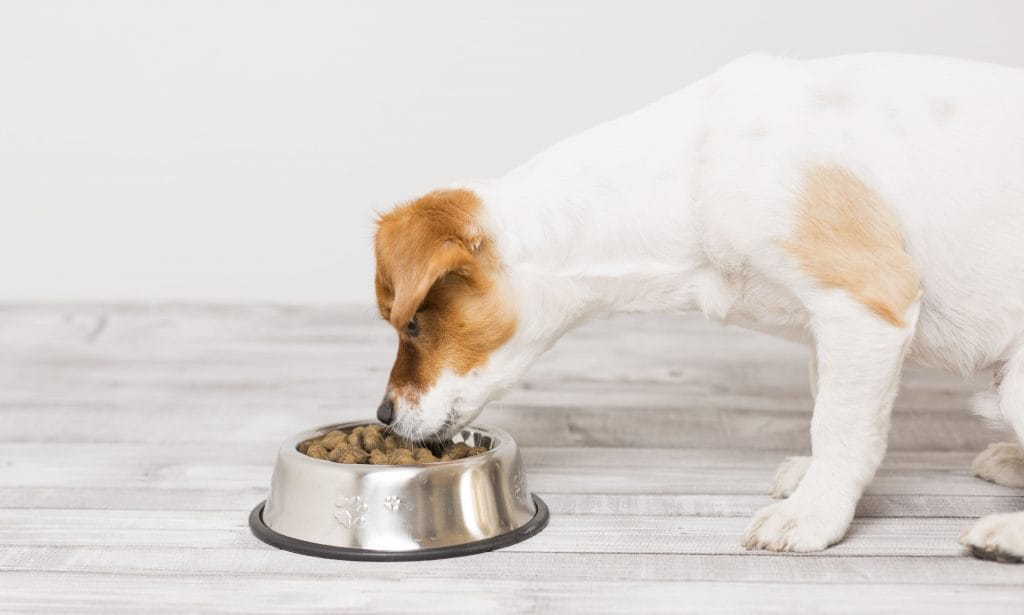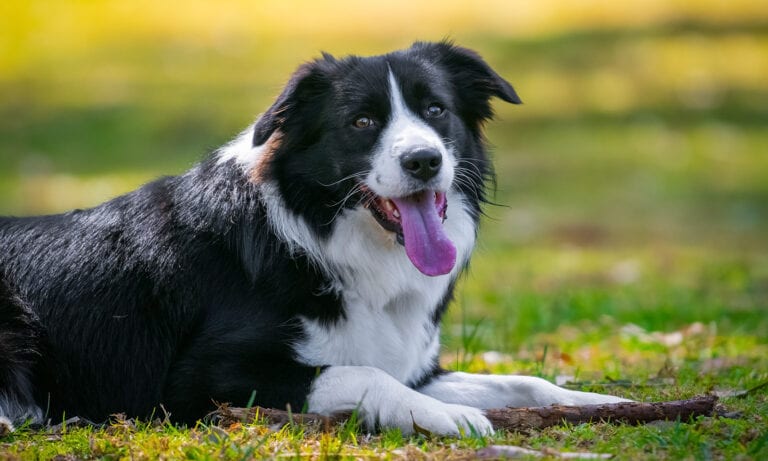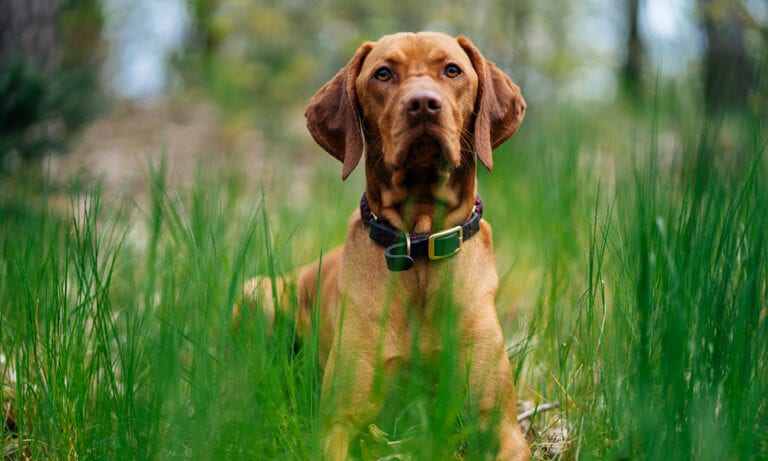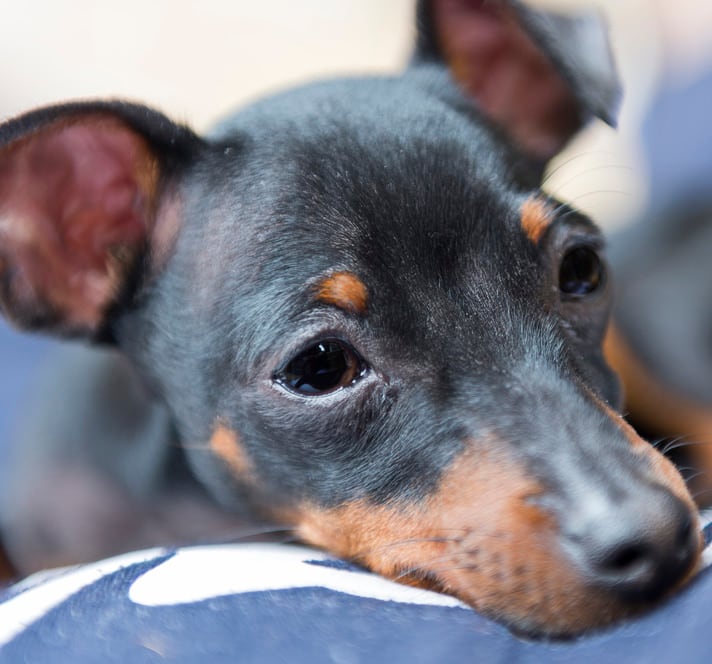When a dog has cancer, their diet can play a significant role in their quality and length of life. But for pet parents, knowing the right foods to offer is often confusing.
Dogs with cancer go through complex biologic changes that require a delicate nutritional balance. While there are some basic guidelines you can follow, dog parents should partner with their veterinarian or other canine health care specialist to determine the best dog food for cancer patients.
In This Guide:
How Does Cancer Affect a Dog’s Digestive Process?
Cancer can disrupt much of a dog’s digestive process. Depending on where the tumor or tumors are located, cancer itself can cause digestive symptoms such as vomiting, diarrhea, loss of appetite, and weight loss. Vomited material may be blood-tinged or have a “coffee-grounds” appearance from partial digestion of the blood in stomach acid.
Cancer of the intestinal tract may cause bright red blood in the stool or dark, tarry stools (called melena), depending on where in the intestinal tract the cancer is present. Cancer in the mouth can cause drooling, sores, and difficulty chewing.
Cancer treatment can also cause digestive issues such as decreased saliva production (known as xerostomia or dry mouth) as well as mouth ulcers and some of the same effects as cancer, such as nausea, vomiting, diarrhea, and loss of appetite. In other words, a dog’s quality of life can be greatly diminished by both cancer and its treatment.
Some parents of dogs with cancer are so anxious to comfort and show love to their furry friend they overfeed their pet. Others feed their pup potentially improperly balanced diets or home-cooked meals, says Adam Christman, DVM, MBA, chief veterinary officer for dvm360. Both are blunders that could make the dog ill or even promote cancer growth, Dr. Christman says.
That's why it's vital to consult with a veterinarian, oncologist, or animal nutrition specialist to ensure you feed your dog the proper diet.
Why Diet Is Important When Your Dog Has Cancer
To understand why diet is so important for dogs with cancer, pet parents should know that cancer is primarily fed through oxygen and carbohydrates, says Carol Osborne, DVM, of Chagrin Falls Veterinary Center & Pet Clinic in Chagrin Falls, Ohio. And while we can’t adjust the oxygen, we can adjust the carbs, she says.
“We prescribe diets in which we try to maintain the animal’s body weight and body condition as we try to starve the cancer,” Dr. Osborne explains.
Studies indicate that cancer cells have a difficult time using fat for energy, but they feast on carbohydrates, says Dr. Osborne, who has conducted research on cancer in animals. She adds that higher levels of omega-3 fatty acids may help reduce tumors.
Dog Cancer Diet: What To Feed a Dog With Cancer
The ideal dog cancer diet is as unique as each dog themselves. But there are general guidelines many vets follow.
- Avoid making drastic changes to your dog’s diet until you’ve consulted a veterinarian, oncologist or another specialist. A primary goal of feeding a dog with cancer is ensuring they maintain their body weight, says Sara Ochoa, DVM, a veterinarian at Animal Hospital of West Monroe in West Monroe, Louisiana and the co-founder of How To Pets. That’s why it’s important for pet parents to consult a vet before making any changes to their dog’s diet.
- Avoid switching up your dog’s food often. This is a major mistake owners make, Dr. Ochoa says, and it can lead to diarrhea and vomiting. "This is not something we like to see with our cancer patients," she says.
- You can gradually mix and match foods. It may be wise to slowly mix and match foods to give dogs a variety in taste, especially if dogs are undergoing chemotherapy. Dr. Ochoa recommends gradually feeding dogs different flavors of the same brand of food to avoid causing stomach upset. “Similar to humans, their taste buds are different, and hence providing a healthy array of foods without causing a food aversion is an important understanding,” she says. “You shouldn’t put your dog on a [limited] diet unless enforced by the veterinarians.”
Best Foods for Dogs With Cancer
For dogs diagnosed with cancer and without other dietary or health concerns, Dr. Osborne recommends a diet full of easy-to-digest fatty high-quality proteins, like chicken, turkey, pork, fish, and eggs. Different cuts of meat or fish have varying amounts of fat, so read labels when you look for these ingredients in store-bought dog foods or prepare homemade dishes with those ingredients.
The best diet for any particular dog can vary, but general guidelines include about 30–40% protein on a dry matter basis (without the moisture content included in the calculation), less than 25% carbohydrates on a dry matter basis, more than 2.5% fiber on a dry matter basis, and 25–40% fat on a dry matter basis.
Store-Bought Dog Food
You can find high quality protein in store-bought dog foods such as Hill's® Prescription Diet® ONC Care Dry Dog Food. "Specially formulated to support dogs fighting cancer," Hill's dry kibble dog food features flavorful fats and highly digestible protein to help maintain muscle mass, strength, and energy. It supports your dog's gut bacteria for a healthy GI microbiome balance, has essential omega-3 fatty acids that provide immune system support, and includes a unique blend of prebiotics that provide consistent stool quality.
This diet approximates the above guidelines but demonstrates variation in the recommendations for cancer diets for dogs with 25% protein, about 34% carbohydrates, 5% fiber, and 21% fat.
Before switching your dog's food, though, check in with your veterinarian, who can assist you in finding the best store-bought choice for your dog.
Homemade Meals for Dogs
Pet parents who cook their own meals for their dog should ensure poultry, pork, fish, and organ meats such as liver are thoroughly cooked to kill microbes both inside and on the surface of the meat, Dr. Christman says.
Also, remember that you want your dog to maintain their weight.
“You are not looking for lean cuts. You are looking for cuts with fat,” Dr. Osborne says. “When it comes to vegetables, look for cruciferous ones. Certain cruciferous vegetables, including cauliflower and turnips, have cancer-fighting properties.”
Before feeding your pet a homemade diet, however, seek advice from your vet or a board certified veterinary nutritional specialist, who can ensure the diet is balanced and individually tailored for your pet.
Learn more about homemade pet food for dogs with cancer.
Supplements To Give a Dog With Cancer
Supplements may help ensure your dog with cancer has a balanced diet, especially if the parent is cooking the food, Dr. Ochoa says.
Dr. Christman recommends probiotics, vitamin B complex, amino acids, iron and eicosapentaenoic acid (EPA) and docosahexaenoic acid (DHA), which are two of several omega-3 fatty acids.
- Probiotics: Probiotics help support the immune system. Probiotics boost the amount of good bacteria that competes with the harmful bacteria for nutrients and intestinal binding sites. This helps support a healthy immune system.
- Vitamin B complex: B vitamins are essential for the immune system and digestive tract function.
- Amino acids: Amino acids are the basic building blocks of proteins, which form muscle and other body tissues.
- Iron: “Iron is a key component of hemoglobin, which binds to and transports oxygen around the body,” says Dr. Christman. “Cancer and chemotherapy can contribute to anemia, so giving an iron supplement to cancer patients can help combat anemia.”
- EPA and DHA: EPA and DHA not only decrease muscle and weight loss in cancer patients, per PetMD, but these two omega-3 fatty acids also modify the inflammatory response of the immune system to cancer activity, reducing tissue damage by decreasing certain inflammatory molecules. “With cancer, there can be a muscle-wasting effect that leads to weight loss and overall weakness,” Dr. Christman says. Severe loss of both muscle and fat is a condition called cancer cachexia.
What about CBD? "People have been reaching for CBD oils to help with appetite and cancer,” Dr. Ochoa says. “CBD should be discussed with your veterinarian to make sure it will not interact with any other treatment they are receiving. At this time, we have limited research done on the effects of CBD in cancer patients.”
In addition, supplements like CBD are not currently FDA-approved, so there can be great variation in quality and purity of the products, even across different batches from the same manufacturer. Not every manufacturer does quality assurance testing or proper randomized controlled trials with their products. As such, it is difficult to guarantee safety and efficacy with certain supplements.
These are factors to consider when looking into CBD products for a dog with cancer while consulting with your primary veterinarian or a veterinary oncologist about which supplements might be appropriate for your dog.
Superfoods for Your Dog
Veterinarians all have different go-to human foods they recommend for their patients. Organic foods (since no pesticides is a good way to go), high-protein foods and cruciferous vegetables, as well as berries, are often high on their lists.
Some of the most popular superfoods for dogs include:
- Broccoli and kale
- Chicken
- Fish, such as salmon
- Organ meat
- Eggs
- Strawberries, blueberries, and blackberries
When feeding your dog human foods, remember that these treats should only constitute a small percentage of your pet’s daily calorie total, less than 10%. Meat sources, including organ meats, should be fully cooked before offering them to your dog. Consult your veterinarian before offering these food items.
What To Do if Your Dog Begins To Lose Their Appetite
Another point to consider is that dogs rely heavily on their sense of smell, and it is closely related to appetite. If your dog begins to lose their appetite from cancer or from chemotherapy, lightly season their food with dog-safe spices, like coriander, turmeric, and ginger, just as you would your own food, Dr. Osborne says. Consult your veterinarian before offering these spices.
Other options for enticing your dog to eat include warming up canned food to increase the aroma, soaking dry kibble in a bit of warm water both to soften it and increase aroma, and topping their kibble or canned diet with food toppers, such as Greenies™ Smart Toppers™. The benefit of a food topper like this is that it can increase the amount of protein in the diet to help improve and maintain the amount of lean muscle mass in dogs suffering from cancer cachexia (muscle wasting and fat loss).
Foods To Avoid
Again, no one diet suits all dogs with cancer. Vets’ dietary decisions are based on a dog's history, other diseases the pet might have, and the stage and type of cancer.
However, it’s sometimes suggested to go grain-free or choose food that has oats or other whole grains.
“The most dramatic metabolic disturbance occurs in carbohydrate metabolism,” Dr. Christman says. “Cancer cells metabolize glucose from carbohydrates through a process called anaerobic glycolysis, which forms lactate as a byproduct. The dog’s body must then expend energy to convert that lactate into a usable form. The result? The tumor gains energy from carbohydrates, while the dog suffers a dramatic energy loss.”
Many commercial dog foods have grains because they are good sources of dietary fiber to promote gut health and because grains are an important source of carbohydrates for energy in otherwise healthy dogs. If you want to feed a grain-inclusive diet to your dog with cancer but are concerned about the level of carbohydrates in the diet, make sure that the first ingredient on the label is protein, that the protein amount is sufficient, and the grain source is a whole grain.
As discussed above, ideal carbohydrate levels for grain-inclusive diets are around 25% or less on a dry matter basis, but the best carbohydrate balance for your dog can vary based on your veterinarian’s determination, so feeding your dog a high-quality diet that meets Association of American Feed Control Officials (AAFCO) standards for complete and balanced nutrition with sufficient protein, fat, carbohydrate, and fiber levels is most important when selecting a diet for your dog.
But vets caution that not all dogs with cancer respond well to high-protein diets. In fact, Dr. Christman warns a high-protein diet may have negative results for some dogs, specifically those who have both cancer and other medical concerns, such as kidney failure.
Again, pet parents should consult with their specialists to determine if a high-protein diet is right for their dog.
Receiving a cancer diagnosis for your dog can be one of the scariest things you go through as a pet parent. A proper diet, with input from your vet or other pet care specialist, is one weapon in your arsenal that can help in your battle. Don’t expect a diet to produce miracles, though. It’s only one part—albeit an important part—of your dog’s cancer treatment plan.
Learn more about cancer in dogs, including the tools and products that can help improve your pet's quality of life.
Expert input provided by Adam Christman, DVM, MBA, chief veterinary officer for dvm360; Carol Osborne, DVM, of Chagrin Falls Veterinary Center & Pet Clinic in Chagrin Falls, Ohio; and Sara Ochoa, DVM, a veterinarian at Animal Hospital of West Monroe in West Monroe, Louisiana, and the co-founder of How To Pets.
This content was medically reviewed by Chewy vets.
More on caring for a dog with cancer:
Share:











